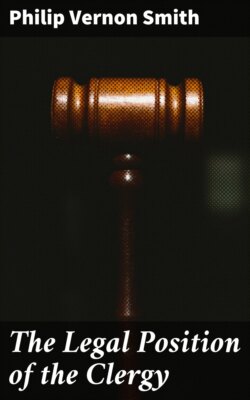Читать книгу The Legal Position of the Clergy - Philip Vernon Smith - Страница 25
На сайте Литреса книга снята с продажи.
Оглавление1. In the case of all benefices, admission is granted by the bishop, as primarily charged with the cure of souls throughout his diocese; but, unless there is good legal reason to the contrary, he is bound to admit the clerk who is presented by the patron of the benefice, if the presentation is made within six calendar months after the benefice became vacant. If that period passes without a presentation being made, the right of appointment lapses to the bishop. If he does not appoint within a further like period, it goes to the archbishop of the province, and if he fails to appoint within another period of six calendar months, it devolves finally on the Crown.[32] The period for lapse dates from the day of the vacation of the benefice if it occurred by death or acceptance of another living.[33] But if the vacancy was created by resignation or deprivation or avoidance of the benefice for non-residence, or if a clerk who is presented is rejected for want of ability or moral character, the period will only begin to run from the time when notice of the fact is given by the bishop to the patron,[34] except in the case of an ecclesiastical patron who (unless the case comes under the Benefices Act, 1898, ss. 2, 3) is not entitled to such notice.[35] Moreover, in reckoning the period for lapse, no account is to be taken, in the case of the first and second presentations by a patron in respect of the same vacancy, of the time between a presentation and the bishop's refusal to admit the presentee, or of the period between that refusal and a decision of a court upon it, nor, in the case of a collation by the bishop, of the time between the service of the prescribed notice on the churchwardens and the expiration of a month from that service.[36]
